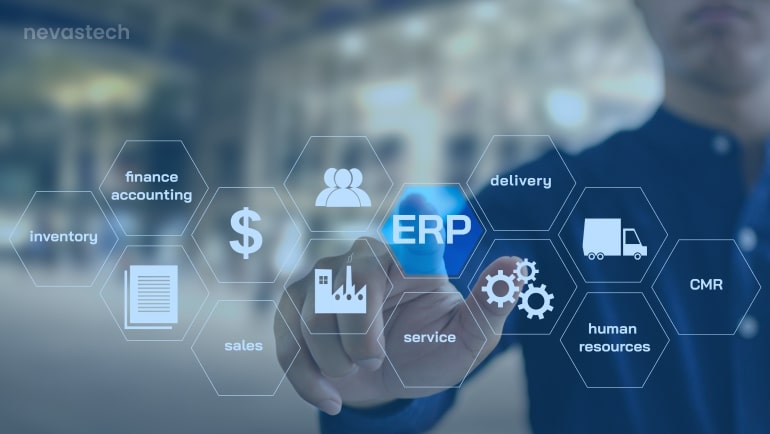Selecting an ERP system is no small decision.
As businesses strive for more effective operations, enterprise resource planning (ERP) software is an increasingly sought-after solution for enhancing processes at the business application level. ERP software combines many back-office applications, business processes, and workflows into a single platform. It has the potential to provide new benefits such as improved data exchange, increased data quality, accuracy and administrative visibility.
Despite all of the benefits that an ERP system may provide, many businesses make the mistake of selecting an ERP solution that does not fit their company business model and goals. Learn not only the most basic aspects that your firm should prioritize in an ERP platform, but also some of the more specialized features to consider and the procedures to take when selecting an ERP system for your business.
Essential Features you need in an ERP solution
ERP solutions are intended to unite applications and processes across multiple business use cases. ERP platforms should always have the following basic features in order to effectively drive visibility and performance for a variety of departmental workflows :
- Integrations with other enterprise applications, either natively or via APIs
- Workflow management and automation
- Business intelligence and data analytics (BI)
- Data visualization and reporting
- Dashboards for admins with real-time tracking
- Custom, granular user and administrative permissions
- Robust databases and data storage
- Compliance and policy management aid
Core modules in an ERP solution
Although some ERP systems just provide the fundamental functionalities required for back-office process management, many ERP platforms take a broader approach, offering modules for various industries and business use cases that may be added on or rolled back as needed. If you operate in a highly specialized industry, you should think about what modules you’ll need and whether your preferred vendor offers them. These are some of the most prevalent ERP software modules:
- Accounting and finance management
- E-commerce management
- Patient, staff, and inventory management in healthcare
- Supply chain and order management
- Inventory and resource management
- Customer relationship management (CRM) and marketing automation
- Human resource and workforce management, including payroll administration
- Manufacturing and facilities management
Best practices for selecting an ERP system
Just because an ERP platform is well-known or well-reviewed does not mean it is a perfect fit for your business. Apply these best practices and follow the below given steps during your ERP selection process to select an ERP system that is optimal for your organization and its existing technologies:
1. Create an ERP research and selection team
When studying and selecting an ERP system, no single IT professional or business leader should work alone. Include not only members of the IT team, but also important stakeholders from other departments who will be using this tool. They can tell you more about the applications they use on a daily basis, as well as their current processes, inefficiencies, and important requirements for a new platform.
2. Audit your existing enterprise applications and workflows
Consider what is and isn’t functioning in your current business processes and applications before selecting an ERP system. A network audit is the best approach to acquire a comprehensive picture of current procedures and bottlenecks. This procedure will assist you in identifying present silos and security issues, as well as legacy tools that need to be replaced and tools that are no longer in use.
3. Focus on data quality improvements
It’s a good idea not to replicate any data problems, errors, or inefficiencies in a new system while performing a major system shift. Consider investing in data cleansing and other data quality tools to improve data accuracy and relevance prior to an ERP migration. This steps will save your team time and money while also providing you with a better understanding of where data is currently stored and how it is being used.
4. Prioritize ERP modules for your business use cases
To manage their business effectively, each business will require different ERP modules. Consider where your company’s biggest pain points are right now, especially in terms of your business applications and how well they work. Whether you want to manage workflows in supply chain or employee life cycles for human resources, most big vendors will provide a module that simplifies your approach. It is critical not to spend on modules that will not benefit your team in any way.
5. Consider your IT team’s technical backgrounds and skills
Is your staff made up of less experienced IT professionals who will set up and manage the ERP platform, or are they more experienced? When determining whether to go with a user-friendly, templated ERP or a more open-source, customized ERP, consider your team’s expertise and knowledge. Before getting started, you should also research what customer support for a given ERP software look like.
6. Prepare documentation and questions for a product demo
As prospective ERP customers, your team should schedule a product demo with a customer experience specialist. However, before you go through the product demo process, prepare documentation and key questions to ensure that the demo covers everything you need to know before making a purchase.
Choosing the right ERP System for your business
The ERP platform you choose and how your team configures it will have an impact on all critical users, applications, and daily business activities. Your entire organization will be set up for success when they continue to select modules and deploy the tool across multiple departments if your team puts the necessary time and research into choosing the correct ERP system. It’s critical to consider the features available in your platform, who can and will help your implementation along the way, and how this platform will evolve with your demands over time.
If you have questions about ERP software, please don’t hesitate to contact our team of ERP specialists.




